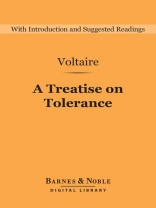This edition includes a modern introduction and a list of suggested further reading.
On March 10, 1762, Jean Calas, a Protestant merchant, was publicly executed in Toulouse, France. This punishment had been prescribed by the regional parliament, with hopes that Calas would confess to murdering his adult son in order to prevent his conversion to Catholicism. Steadfastly declaring his innocence, the elderly Huguenot expired after hours of suffering, his limbs broken one by one before the executioner strangled him and burned his corpse. These were the events that inspired
Voltaire’s
Treatise on Tolerance. Even today the
Treatise on Tolerance stands as one of the most important milestones in the acceptance of religious tolerance in the Western world.
Über den Autor
Born in 1694 to a wealthy Parisian family, Voltaire’s given name was Francois Marie Arouet. Voltaire’s fame as the author of such books as Candide and The Philosophical Dictionary earned him many prestigious titles. However, at age twenty-two, Voltaire had his first of many encounters with censorship and police repression and was exiled. He died in 1778.












